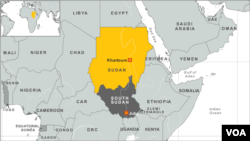South Sudan's President Salva Kiir has ordered troops to pull back from the border with Sudan, as part of efforts to create a demilitarized zone between the countries.
South Sudan military spokesman Philip Aguer confirmed Monday the army has been told to move back, following an agreement the two Sudans signed in Addis Ababa on Friday. He said, "Within four days they will be able to pack all their equipment and start moving to the designated areas. That is 10 kilometers away from the buffer zone."
The agreement calls for both sides to pull back their troops from the border by March 14. Aguer said it would take about two weeks to complete the move.
There was no word when Sudan may begin a similar pullback.
Aguer said the pullback of the southern army, the SPLA, should not be seen as a sign of weakness.
"This will not take away the role of the SPLA to continue protecting the integrity and sovereignty of South Sudan," he said. "So if there's any attack, any violation, the SPLA will continue doing its usual role to protect the territory and the integrity of South Sudan."
South Sudan and Sudan have previously tried - and failed - to solve a range of disputes, including differences over borders and control of oil fields.
The south separated from the north in July 2011 after decades of civil war.
South Sudan military spokesman Philip Aguer confirmed Monday the army has been told to move back, following an agreement the two Sudans signed in Addis Ababa on Friday. He said, "Within four days they will be able to pack all their equipment and start moving to the designated areas. That is 10 kilometers away from the buffer zone."
The agreement calls for both sides to pull back their troops from the border by March 14. Aguer said it would take about two weeks to complete the move.
There was no word when Sudan may begin a similar pullback.
Aguer said the pullback of the southern army, the SPLA, should not be seen as a sign of weakness.
"This will not take away the role of the SPLA to continue protecting the integrity and sovereignty of South Sudan," he said. "So if there's any attack, any violation, the SPLA will continue doing its usual role to protect the territory and the integrity of South Sudan."
South Sudan and Sudan have previously tried - and failed - to solve a range of disputes, including differences over borders and control of oil fields.
The south separated from the north in July 2011 after decades of civil war.





